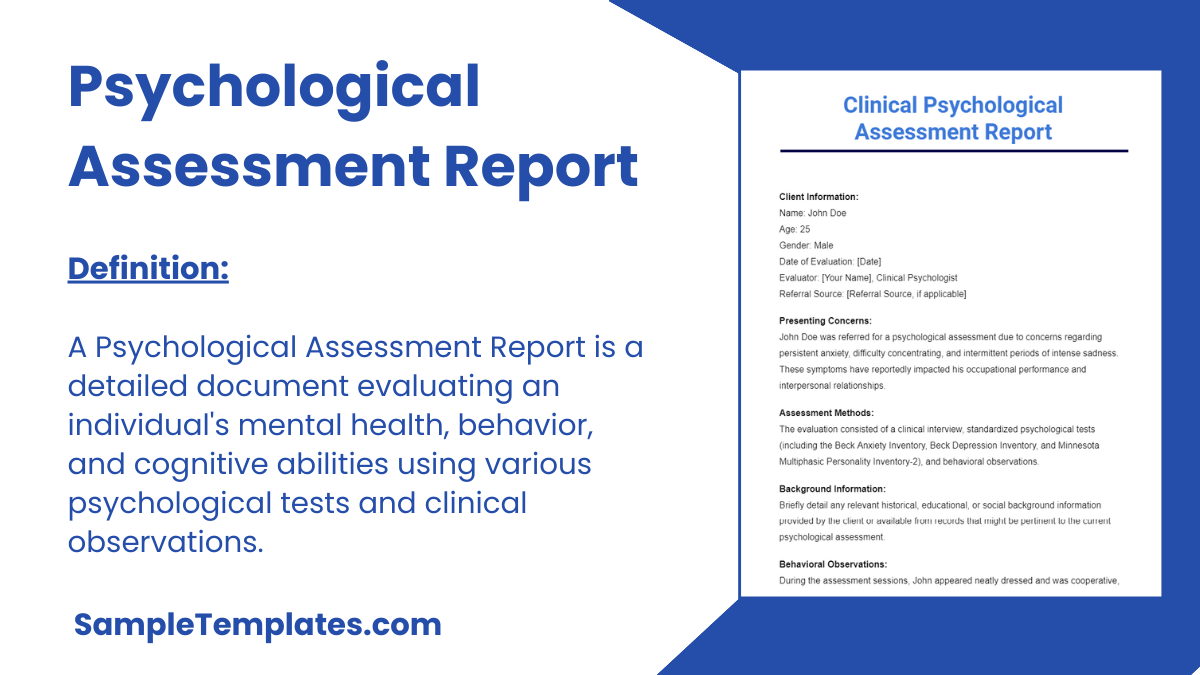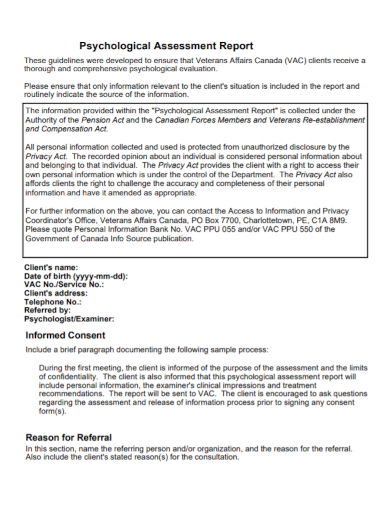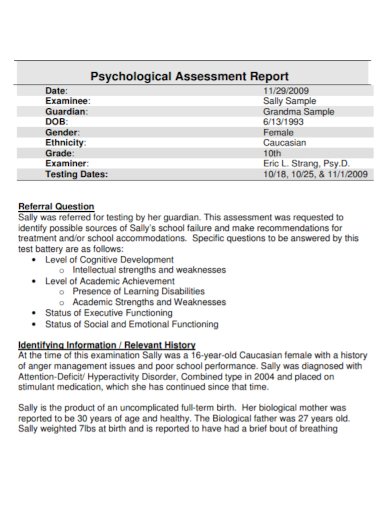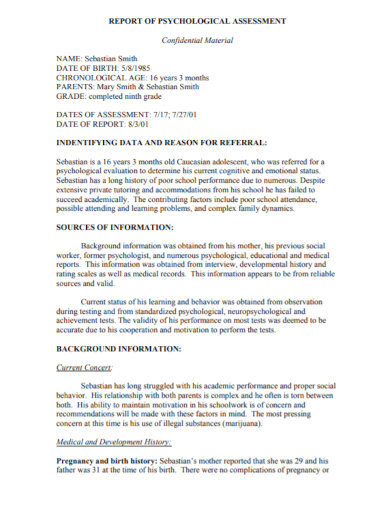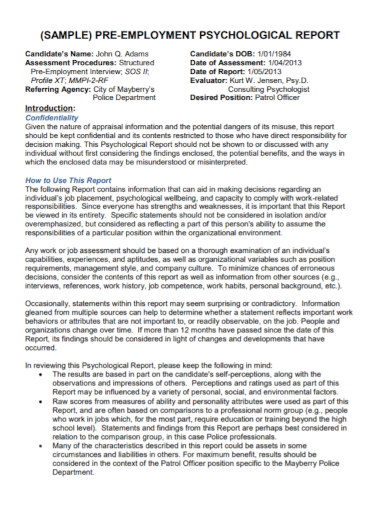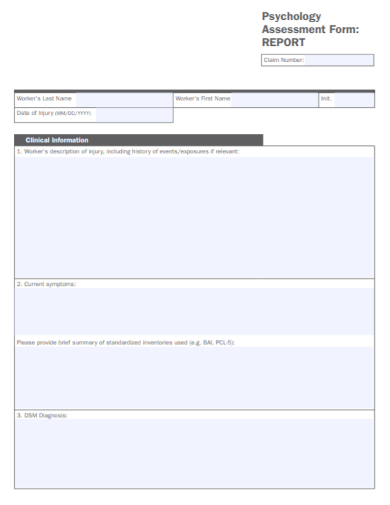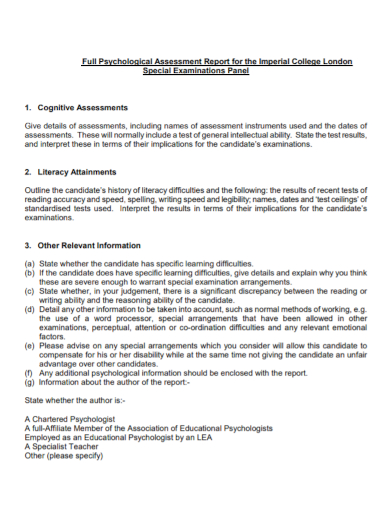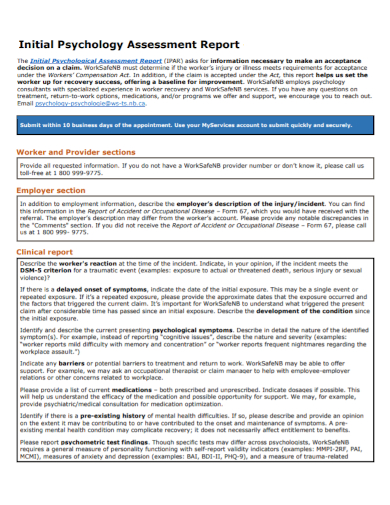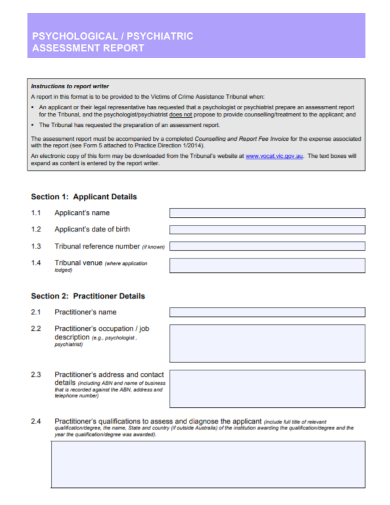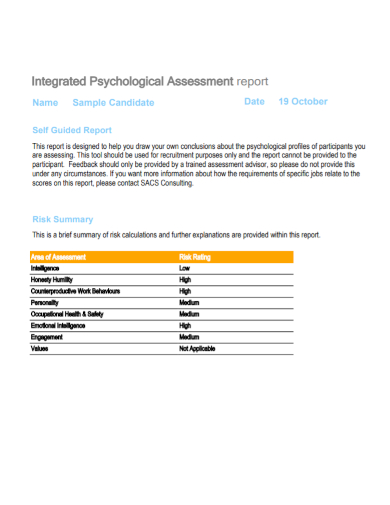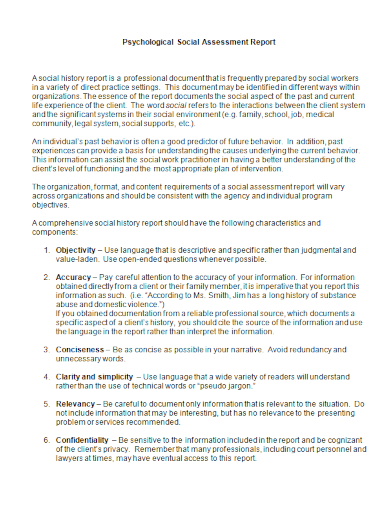Before people go into therapy or any other case, usually clinical, an evaluation must be done as to understand the person’s mental functioning. Throughout human history, there has always been some sort of psychological assessment sample, thought they might not had called it that. Psychological assessments aim to recognize, characterize, and measure a person’s versatile and maladaptive practices and treatment objectives. Essentially, it is the systematical evaluation of someone’s conduct. These are usually done by psychologists and psychiatrists. This article is to help simplify the process by providing free and editable samples of Psychological Assessment Report Sample. Keep scrolling to find out more!
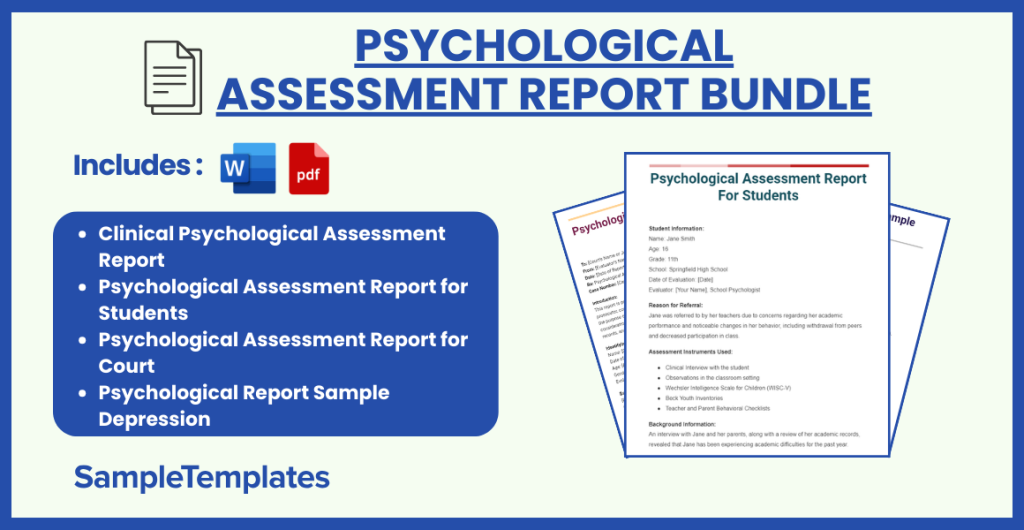
Download Psychological Assessment Report Bundle
Clinical Psychological Assessment Report
Client Information:
Name: John Doe
Age: 25
Gender: Male
Date of Evaluation: [Date]
Evaluator: [Your Name], Clinical Psychologist
Referral Source: [Referral Source, if applicable]
Presenting Concerns:
John Doe was referred for a psychological assessment due to concerns regarding persistent anxiety, difficulty concentrating, and intermittent periods of intense sadness. These symptoms have reportedly impacted his occupational performance and interpersonal relationships.
Assessment Methods:
The evaluation consisted of a clinical interview, standardized psychological tests (including the Beck Anxiety Inventory, Beck Depression Inventory, and Minnesota Multiphasic Personality Inventory-2), and behavioral observations.
Background Information:
Briefly detail any relevant historical, educational, or social background information provided by the client or available from records that might be pertinent to the current psychological assessment.
Behavioral Observations:
During the assessment sessions, John appeared neatly dressed and was cooperative, though he exhibited signs of nervousness, such as fidgeting and avoiding eye contact. He was articulate in describing his experiences, and his speech was coherent and goal-directed.
Test Results:
- Beck Anxiety Inventory: John scored a 28, indicating moderate to severe anxiety.
- Beck Depression Inventory: A score of 21 suggests moderate depression.
- Minnesota Multiphasic Personality Inventory-2: Results highlight elevated scales in depression, anxiety, and social isolation.
Clinical Impressions:
John’s self-reported symptoms, coupled with his scores on psychological measures, suggest a diagnosis of Major Depressive Disorder with comorbid Generalized Anxiety Disorder. His difficulty in concentrating and persistent worry appear to significantly impair his daily functioning.
Recommendations:
- Psychotherapy: Initiate cognitive-behavioral therapy to address symptoms of depression and anxiety, focusing on cognitive restructuring and anxiety management strategies.
- Psychiatric Consultation: Recommend a consultation with a psychiatrist to evaluate the need for pharmacotherapy.
- Lifestyle Modifications: Encourage regular physical activity, a healthy diet, and adequate sleep to improve overall mental health.
- Follow-up Assessment: Schedule a follow-up assessment in three months to evaluate progress and adjust treatment plans as necessary.
Conclusion:
This assessment provides a snapshot of John’s current psychological functioning. It is recommended that the outlined treatment strategies be initiated to address his symptoms of depression and anxiety. Continuous monitoring and adjustments to the treatment plan will be essential to his recovery process.
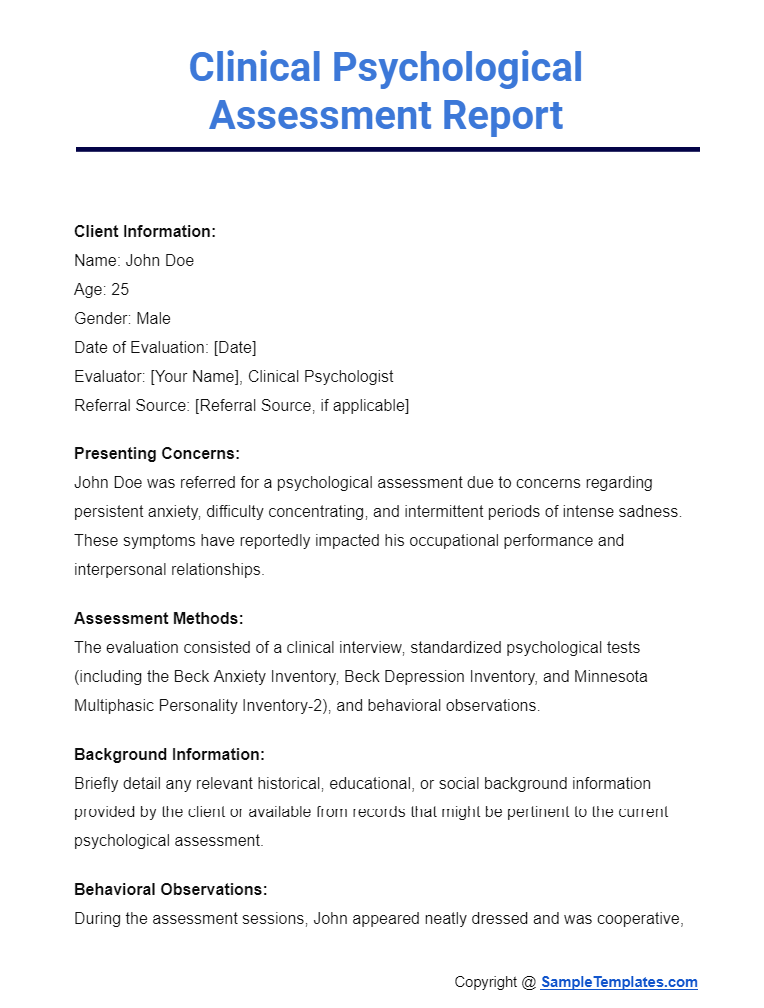
Psychological Assessment Report for Students
Student Information:
Name: Jane Smith
Age: 16
Grade: 11th
School: Springfield High School
Date of Evaluation: [Date]
Evaluator: [Your Name], School Psychologist
Reason for Referral:
Jane was referred by her teachers due to concerns regarding her academic performance and noticeable changes in her behavior, including withdrawal from peers and decreased participation in class.
Assessment Instruments Used:
- Clinical Interview with the student
- Observations in the classroom setting
- Wechsler Intelligence Scale for Children (WISC-V)
- Beck Youth Inventories
- Teacher and Parent Behavioral Checklists
Background Information:
An interview with Jane and her parents, along with a review of her academic records, revealed that Jane has been experiencing academic difficulties for the past year. Teachers reported a decline in her grades and participation. Jane’s parents have observed her spending more time alone in her room.
Behavioral Observations:
During the assessment, Jane was cooperative but appeared reserved and hesitant to talk about herself. She engaged more openly when discussing non-personal topics, such as her interests in art.
Test Results:
- WISC-V: Jane’s overall IQ score is in the average range, with relative strengths in verbal comprehension and weaknesses in processing speed.
- Beck Youth Inventories: Indicated moderate levels of depression and anxiety.
- Teacher and Parent Behavioral Checklists: Both sources noted concerns with attention and withdrawn behaviors.
Summary of Findings:
Jane’s academic struggles appear to be related to her emotional state, with test findings suggesting moderate levels of anxiety and depression. These emotional challenges, coupled with her slower processing speed, seem to contribute to her difficulties in maintaining attention and engagement in schoolwork and social interactions.
Recommendations:
- Counseling Services: It is recommended that Jane receive individual counseling to address her symptoms of depression and anxiety. This could include cognitive-behavioral therapy techniques aimed at improving her mood and anxiety levels.
- Learning Support: Given her processing speed challenges, Jane may benefit from accommodations such as extended time on tests and assignments to help alleviate academic pressure.
- Social Skills Group: Participation in a social skills group could help Jane develop strategies for initiating and maintaining peer relationships, thereby reducing her feelings of isolation.
- Parent and Teacher Collaboration: Encourage regular communication between Jane’s parents and teachers to monitor her progress and adjust interventions as needed. A team approach will be crucial for Jane’s success.
Conclusion:
Jane is a 16-year-old student facing academic and social challenges likely influenced by underlying emotional difficulties. With appropriate interventions focusing on her mental health and learning needs, along with supportive engagement from her family and school, Jane has the potential to overcome these barriers and achieve her academic and social goals.
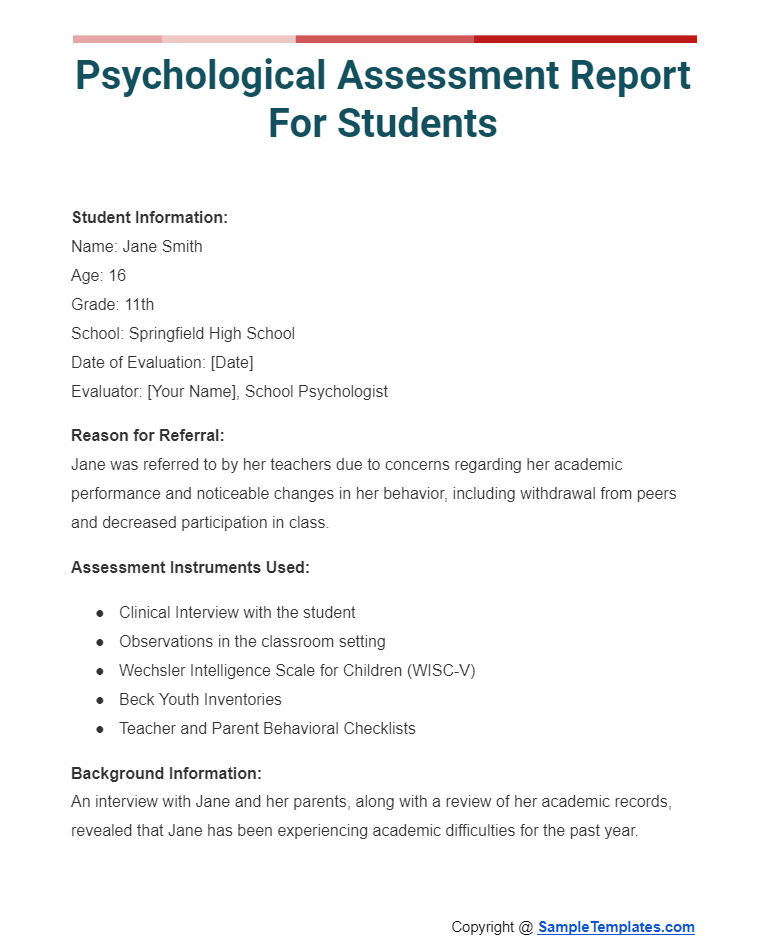
Psychological Assessment Report for Court
To: [Court’s Name or Judge’s Name]
From: [Evaluator’s Name], Clinical Psychologist
Date: [Date of Report]
Re: Psychological Assessment of [Client’s Full Name]
Case Number: [Case Number]
Introduction:
This report is provided at the request of [Requesting Party, e.g., defense attorney, prosecutor, court], concerning [Client’s Full Name], herein referred to as “the client,” for the purpose of [Specify Purpose, e.g., assessing fitness to stand trial, sentencing considerations]. The following assessment is based on a clinical interview, review of records, and standardized psychological testing conducted on [Date(s) of Assessment].
Identifying Information:
Name: [Client’s Full Name]
Date of Birth: [DOB]
Age: [Age]
Gender: [Gender]
Evaluation Dates: [Dates]
Background Information:
[Provide a brief summary of relevant historical, educational, and social background information provided by the client or obtained from records.]
Reason for Referral:
[Detail the specific reason(s) for the psychological assessment as it relates to the legal context.]
Assessment Methods:
- Clinical Interview
- Review of Medical and Psychiatric Records
- Standardized Psychological Tests (e.g., MMPI-2, WAIS-IV)
- Behavioral Observations
- Collateral Interviews (if applicable)
Behavioral Observations:
[Describe the client’s appearance, demeanor, and cooperativeness during the assessment. Note any relevant behaviors that could impact the findings.]
Clinical Findings:
Cognitive Functioning:
- Results from [Name of Cognitive Test, e.g., WAIS-IV] indicate [Brief Summary of Findings].
Personality Assessment: - The [Name of Personality Test, e.g., MMPI-2] was administered, revealing [Brief Summary of Findings].
Mental Health Status: - [Discuss any diagnosed psychological conditions, symptoms observed, and their potential impact on the client’s behavior or decision-making.]
Conclusions and Opinions:
Based on the comprehensive assessment, it is my professional opinion that [Summarize Key Conclusions related to the legal question, e.g., the client’s mental state at the time of the offense, competency to stand trial].
Recommendations:
- [Provide specific recommendations, such as the need for psychiatric treatment, considerations for sentencing, or suitability for rehabilitation programs.]
Limitations of the Assessment:
[Discuss any limitations of the evaluation, such as incomplete information or the client’s response style during testing.]
Statement of Understanding:
I declare that the information provided in this report is accurate to the best of my knowledge and reflects my professional opinion based on the assessment conducted. This report is intended for use in legal proceedings related to [Client’s Full Name] and should be considered confidential.
Evaluator:
[Your Name, Credentials]
[Your Contact Information]
Confidentiality Notice:
This document contains confidential psychological information and is intended for the use of the individual or entity to whom it is addressed. Unauthorized use, disclosure, or copying is strictly prohibited and may be unlawful.
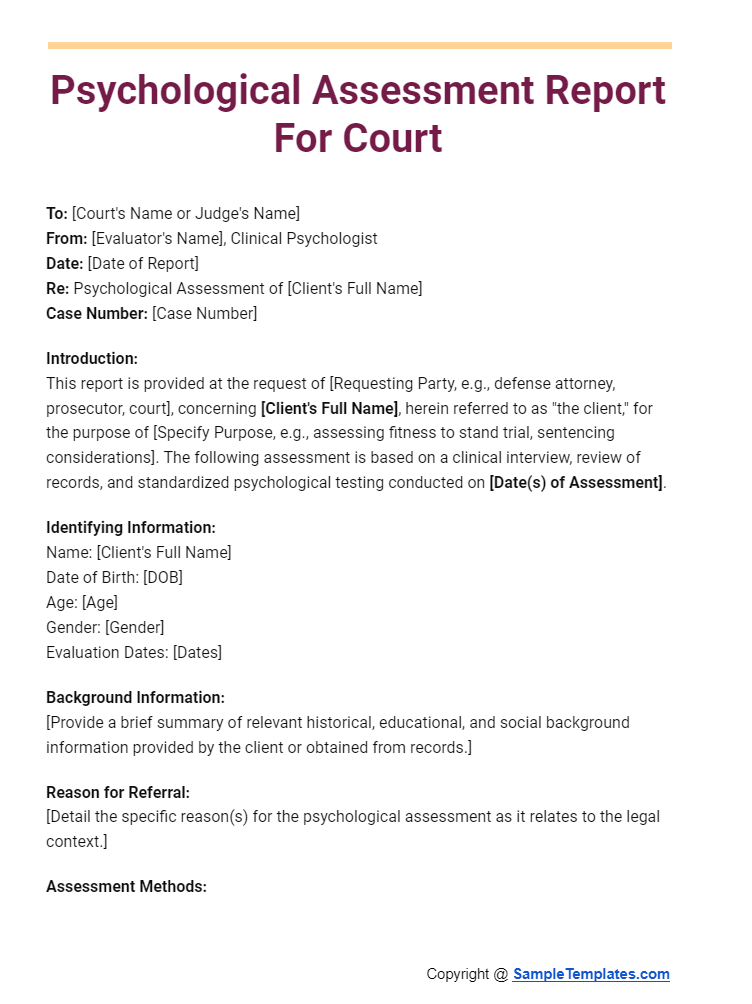
Psychological Report Sample Depression
Client Information:
Name: Alex Johnson
Date of Birth: MM/DD/YYYY
Age: 30
Gender: Male
Date of Evaluation: MM/DD/YYYY
Evaluator: Dr. Emily Clarke, Clinical Psychologist
Referral Reason:
Alex was referred for psychological evaluation due to persistent feelings of sadness, lack of energy, and difficulty concentrating, which have been impacting his daily functioning and quality of life.
Background Information:
Alex is a 30-year-old male who has been experiencing a significant decline in mood over the past six months. He reports a loss of interest in previously enjoyed activities, increased sleep disturbances, and feelings of worthlessness. Alex has a history of depression in his family and mentions a stressful work environment as a contributing factor to his current state.
Assessment Methods:
- Clinical Interview
- Beck Depression Inventory (BDI-II)
- Hamilton Depression Rating Scale (HDRS)
- Observations during the evaluation
Behavioral Observations:
Alex appeared neatly dressed but looked tired. He made minimal eye contact and spoke in a low, monotone voice. His responses were coherent but required prompts for elaboration. Alex showed signs of psychomotor retardation.
Clinical Findings:
Beck Depression Inventory (BDI-II): Alex scored a 35, indicating severe depression. He endorsed items related to pessimism, feelings of failure, and dissatisfaction with life.
Hamilton Depression Rating Scale (HDRS): Alex’s score of 24 suggests a moderate to severe level of depression, with significant symptoms such as weight loss, sleep disturbance, and psychomotor agitation being reported.
Diagnosis:
Based on the DSM-5 criteria and the findings from the assessment, Alex meets the criteria for Major Depressive Disorder, Single Episode, Severe Without Psychotic Features.
Treatment Recommendations:
- Psychotherapy: Initiating Cognitive Behavioral Therapy (CBT) to address negative thought patterns, improve mood, and develop coping strategies for stress management.
- Medication: A referral to a psychiatrist for evaluation and consideration of antidepressant medication may be beneficial in conjunction with psychotherapy.
- Lifestyle Modifications: Encourage regular physical activity, a healthy diet, and adequate sleep to support overall mental health.
- Support System: Engage family and friends in Alex’s treatment process for additional support and to facilitate a supportive environment.
Conclusion:
Alex is currently experiencing severe depression, significantly impacting his daily life. A combination of psychotherapy, potential pharmacotherapy, and lifestyle changes are recommended for the treatment of his depression. It is crucial to monitor Alex’s progress closely and adjust the treatment plan as necessary to ensure the most effective care and support.
Confidentiality Notice:
This psychological evaluation report is confidential and intended solely for the use of the individual or entity to whom it is addressed. Unauthorized use, disclosure, or duplication is prohibited.
Evaluator’s Signature:
Dr. Emily Clarke, Clinical Psychologist
[Date]
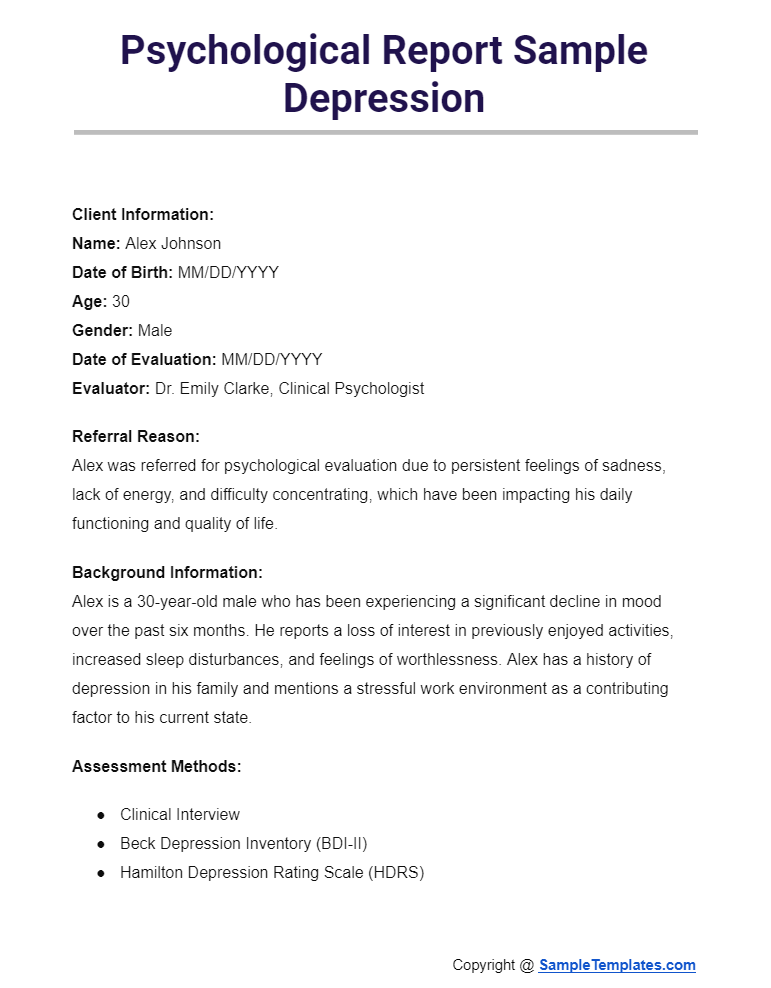
Browse More Templates On Psychological Assessment Report
Psychological Assessment Example
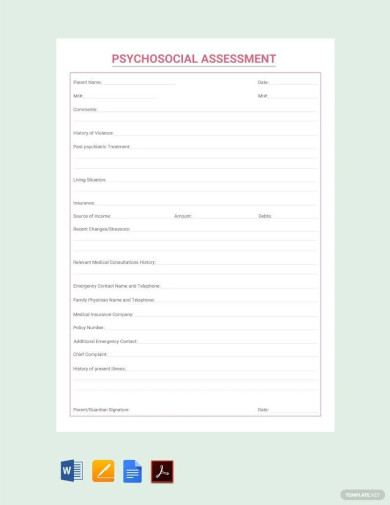
Psychological Report Sample
Psychological Assessment Report Sample
Psychological Evaluation Report Sample
Psychological Report Example
Psychological Assessment Report Template
Benefits of Psychological Assessments Reports
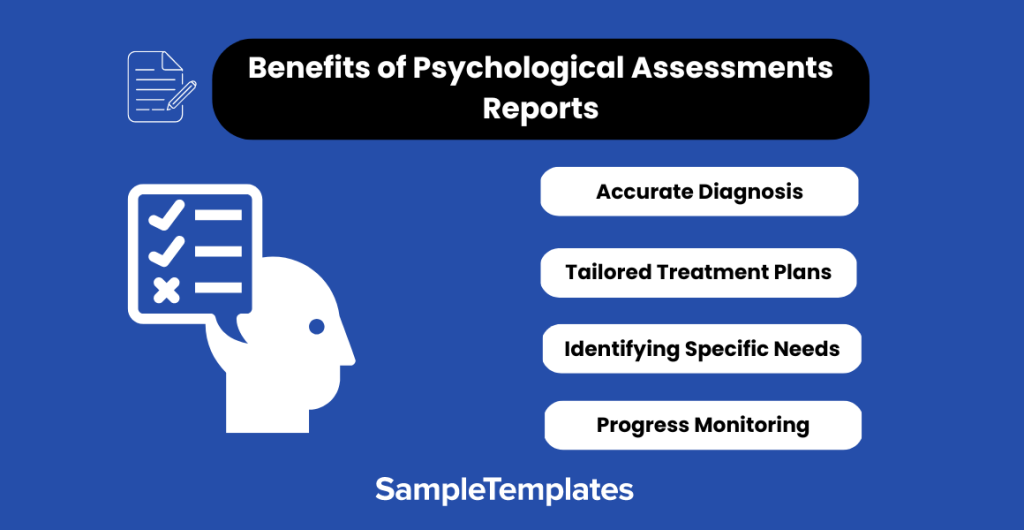
- Accurate Diagnosis: Psychological assessment reports outline provide a comprehensive evaluation of an individual’s mental health, allowing for accurate diagnosis of psychological conditions. This ensures that individuals receive the most appropriate and effective treatment for their specific needs.
- Personalized Treatment Plans: These reports highlight an individual’s unique psychological profile, enabling mental health professionals to tailor treatment plans specifically to the individual’s needs, strengths, and weaknesses.
- Identification of Specific Needs: Psychological assessments can uncover specific areas of concern, such as learning disabilities, attention deficits, or emotional disturbances, guiding interventions and support in educational, clinical, or workplace settings.
- Monitoring Progress: Regular assessments can track an individual’s progress over time, providing valuable feedback on the effectiveness of treatment strategies and facilitating adjustments to enhance outcomes.
- Informed Decision Making: For educators, clinicians, and employers, psychological assessment reports provide evidence-based information to make informed decisions regarding accommodations, interventions, or job placements that best suit the individual’s capabilities and needs.
- Early Detection: Early identification of psychological issues or developmental delays through assessments can lead to timely intervention, which is crucial in mitigating long-term impacts on an individual’s mental health and overall well-being.
- Enhanced Self-awareness: Individuals gain insight into their own behaviors, emotions, and thought processes, which is vital for self-reflection and personal development. Understanding one’s psychological makeup can empower individuals to make informed choices about their health and life.
- Legal and Educational Documentation: Psychological assessment reports can serve as official documentation to support individuals in legal situations (e.g., competency hearings) or educational settings (e.g., requesting accommodations). This documentation is essential for advocating for an individual’s rights and accessing necessary services.
Psychological Report
Psychological Report Template
4 Types of Psychological Assessments
- Clinical Interviews: Clinical interviews are a fundamental type of psychological assessment where psychologists engage in conversations with clients to gather comprehensive information about their psychological state, history, and functioning. These interviews can be structured, with specific questions, or unstructured, allowing for a more open-ended exploration of the client’s issues.
- Standardized Psychological Tests: These tests are scientifically developed tools used to measure various psychological constructs, such as intelligence, personality traits, mental health disorders, and specific abilities. Standardized tests have established norms and procedures, ensuring that results are reliable and valid across different populations. Examples include the Wechsler Intelligence Scale for Children (WISC) and the Minnesota Multiphasic Personality Inventory (MMPI).
- Behavioral Assessments: Behavioral assessments focus on observing and measuring an individual’s behavior in specific contexts or situations. The goal is to understand the frequency, intensity, and circumstances of particular behaviors. Techniques include direct observation, rating scales, and self-monitoring. Behavioral assessments are often used in diagnosing and treating behavioral issues in children and adults.
- Neuropsychological Tests: Neuropsychological tests are used to assess the relationship between brain function and behavior. These tests can help identify cognitive deficits caused by brain injury, neurological disorders, or developmental problems. They cover various cognitive domains, including memory, attention, problem-solving, and language skills. Neuropsychological assessments provide crucial information for diagnosing conditions like dementia, traumatic brain injury, and learning disorders.
Psychological Assessment Report Example
Sample Psychological Assessment Report
Psychological Assessment Report Sample PDF
What Is a Psychological Assessment Report
Psychological assessment is a type of testing that employs a variety of procedures to generate knowledge about an individual’s behavior, personality, and abilities. There are different methods to a psychological assessment, namely, norm-referenced psychological tests, school or medical records analysis, medical evaluation, interviews, observational data, and informal tests. Usually, in a Psychological Assessment Report, there are different sections. This could be the abstract, introduction, method, results, discussion, and references. Furthermore, there are a number of benefits to this type of report like understanding the patient better and letting them know that you do through effective communication. This report is also helpful to other people, such as the patients, their families, clinicians, school officials and more. Needless to say, it is a very important report.
How to Make a Psychological Assessment Report
1. Be sure to base on data.
Of course, the report must be free from any bias. Therefore, it must be heavily and empirically supported by gathered information and current research report. It is also worth noting to use texts on whether different groups, especially if it concerns ethnicity, race, or others, get different results from a test. Write about how what the data says about the patient.
2. Consider patient’s background.
It is important to look for some context from the patient. You must not only consider the patient’s family, love, school, or career life, but also their standpoint when it comes to their race, sexuality or socioeconomics. Find other sources also that might help with the report writing. Then, conceptualize all of these, and see how they take their own role. When you see how they all connect, you would both have an increased sympathy of your patient, which leads us to the next point.
3. Put yourself in the patient’s shoes.
Yes, the report must be grounded in data, but you should also remember to put things sensitively, and use words that aren’t so indelicate. This is because the report is usually read outside of clinical professionals. In fact, the patients and their families would. Also, it is important to sample list down of both your patient’s strengths and weaknesses. It is not enough to speak all facts; compassion is key to a good Psychological Assessment Report.
4. Be precise and jargon-free.
One of the most important objectives of the report is for the patient to be better understood. Using unnecessary and jargon words doesn’t really support that objective. So, be meaningful in your writing. Always follow the narrative and address divergent results. Assessment reports format must, in the end, reassemble patients into being psychologically complete so that they can be best supported moving ahead.
The main takeaway is that people just need to be understood, and it is so fortunate that we have the latest technologies and research to help do so. The evolution in scientific areas are affected by psychological assessment. Making this type of scientific report surely is not easy, but we hope that our free and editable Psychological Assessment Report Samples have not only helped you, but also your patients and their loved ones.
FAQ
What is included in a psychological assessment report?
A psychological assessment report typically includes background information, assessment methods, test results, clinical impressions, diagnosis if applicable, treatment recommendations, and a summary of findings.
What is a good psychological report?
A good psychological report is clear, concise, and organized. It should include relevant background information, assessment results, clinical interpretations, and well-reasoned recommendations that address the client’s needs.
How do you write a psychology report?
To write a psychology report, start with an introduction, provide background information, describe assessment methods, present test results, offer clinical interpretations, make recommendations, and conclude with a summary. Use a formal, organized format.
What are the three different types of psychological examinations?
There are many distinct sorts of psychological tests, including intelligence tests, aptitude tests, vocational tests, attitude tests, and personality tests.
What does a psychological evaluation entail?
Norm-referenced psychological tests, informal tests and surveys example, interview information, school or medical records, medical evaluation, and observational data are all examples of psychological assessments. Based on the exact questions being asked, a psychologist decides what information to use.
What is the purpose of a psychological assessment?
The purpose of a psychological assessment is to evaluate an individual’s cognitive, emotional, and behavioral functioning to diagnose mental health issues, guide treatment planning, and inform decision-making processes.
How can I receive a psychological evaluation?
Contact a medical practitioner, such as a family doctor, psychologist, or psychiatrist, to begin the process of getting a psychological examination. If the assessment falls outside of their area of expertise, you may be directed to another specialist.
In conclusion, this psychological assessment report format provides valuable insights into the individual’s cognitive, emotional, and behavioral functioning. The findings offer a comprehensive understanding of strengths, challenges, and potential areas for intervention. We recommend a collaborative approach to support the individual’s well-being and personal development.
Related Posts
FREE 12+ Sample Testing Reports
FREE 10+ Team Report Samples
FREE 9+ Nursing Assessment Sample Forms
FREE 8+ Sample Psychosocial Assessment
FREE 8+ Sample Job Evaluation Reports
FREE 8+ Evaluation Report Templates
FREE 6+ Sample Self Care Assessment
FREE 7+ Sample Psychology Consent Forms
FREE 49+ Sample Reports
FREE 29+ Sample Reports
FREE 10+ Sample Health Risk Assessments
FREE 10+ Sample Student Reports
FREE 10+ Patient Case Study Samples
FREE 9+ Child Observation Report Samples
FREE 7+ Sample Psychosocial Assessment Forms
